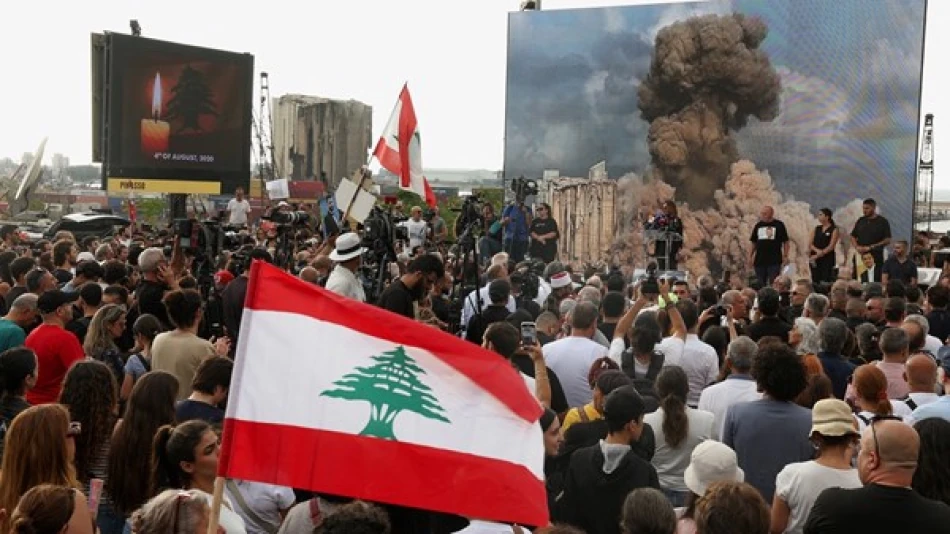
Lebanese Remember 5th Anniversary of Devastating Beirut Port Explosion
Lebanon's Port Blast Victims Still Await Justice Five Years After Catastrophic Explosion
Five years after the devastating Beirut port explosion that killed over 220 people, Lebanese families gathered Monday to commemorate the tragedy while demanding accountability from officials who they say have systematically obstructed justice. The anniversary comes as judicial investigator Tarek Bitar has finally managed to question all defendants in the case, offering a glimmer of hope for families who have watched their pursuit of justice stall for nearly two years due to political interference.
A Tragedy That Shook the World
The August 4, 2020 explosion ranks among the largest non-nuclear blasts in modern history, devastating entire neighborhoods of Beirut and injuring approximately 6,500 people. The blast occurred when improperly stored ammonium nitrate—2,750 tons of it—ignited following a warehouse fire of unknown origin at the port.
What makes this disaster particularly egregious is that multiple officials at various levels of government knew about the dangerous chemicals stored at the port for years but failed to act. This knowledge transforms what might have been viewed as an industrial accident into what many Lebanese consider a crime of negligence.
Political Obstruction Derails Investigation
The investigation has been effectively frozen since 2023, paralyzed by Lebanon's endemic political dysfunction. Senior officials, including former ministers and security chiefs, have refused to appear for questioning, citing parliamentary immunity and other legal technicalities.
This pattern of obstruction reflects Lebanon's broader governance crisis, where political elites routinely evade accountability through sectarian power-sharing arrangements and mutual protection pacts. The port blast investigation has become a test case for whether Lebanon's justice system can function independently of political interference.
Families Refuse to Accept Impunity
At Monday's commemoration, hundreds gathered at the port carrying photos of victims and banners reading "No compromise on accountability" and "The crime of August 4 was not an accident." The emotional weight of the gathering was palpable as organizers displayed photos of all victims on a large screen while reading their names aloud.
"I'm participating for the first time this year. Even though five years have passed, I feel as if the explosion happened yesterday," said 68-year-old Georgette Khoury, who lost three relatives. "What we demand is justice, and if it's not achieved on earth, it will be achieved in heaven."
A Breakthrough Amid Persistent Challenges
The presence of several government ministers at this year's commemoration—including the justice, information, and social affairs ministers—marked the first official participation since the explosion occurred. This shift suggests growing pressure on Lebanon's new leadership under President Joseph Aoun to address the families' demands.
Lawyer Cecile Roukoz, speaking on behalf of victims' families, welcomed recent statements from officials but emphasized that "the test is in implementation, particularly applying pending judicial decisions and executing them with the sword of justice."
Regional Context and International Pressure
Lebanon's handling of the port blast investigation occurs against the backdrop of broader regional upheaval and the country's ongoing economic collapse. The explosion accelerated Lebanon's financial meltdown, wiping out crucial port infrastructure and further damaging investor confidence in a country already struggling with currency devaluation and political instability.
International donors have repeatedly linked reconstruction aid to governance reforms and accountability measures, making the port blast investigation a key indicator of Lebanon's commitment to transparency. The European Union and United States have imposed sanctions on several Lebanese officials, though none directly related to the port explosion.
The Path Forward
With investigator Bitar now having questioned all defendants, the case enters a critical phase. However, Lebanon's track record suggests that even if charges are filed, enforcement remains problematic given the country's weak institutions and culture of impunity.
The families' persistence in demanding justice reflects a broader Lebanese society increasingly unwilling to accept the traditional patterns of elite immunity. Their five-year struggle has become symbolic of ordinary citizens' fight against a political class widely blamed for the country's multiple crises.
As one commemorator noted while holding a photo of a nun killed in the blast: "Achieving justice won't bring back our martyrs, but it will be consolation for us." Whether Lebanon's justice system can deliver that consolation remains the defining question as the case moves forward.
Most Viewed News

 Layla Al Mansoori
Layla Al Mansoori






